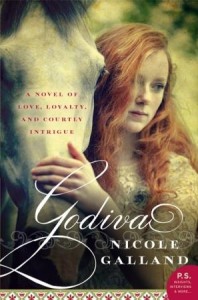Femme Fatality
Guest post by Nicole
Galland, author of Godiva (pubs July 2)
The heroine of my novel Godiva
is, I am finally ready to confess, a femme fatale. She uses her feminine wiles
to get what she wants, and what she wants isn’t what her victims suspect. It is
most often to coax information, agreement or obedience from a person of the
(usually) male persuasion. She does this with meaningful smiles,
eyelash-batting, suggestive voice and body language – but nothing more. She
offers the promise of seduction without ever actually seducing. As she
cheerfully explains to her disapproving abbess friend: “I find flirting an
effective way of getting a man’s complete attention while conveniently
disarming him at the same time.”
Here’s the thing: I’ve always felt ambiguous about femme
fatales. On the one hand, sure, they are charismatic, ballsy women who know how
to get what they want without answering to anyone (think Cleopatra or Mata
Hari, although they both ended badly); on the other hand, as role models, they
emanate the message, easily skewed in the female adolescent brain, that you can
have almost anything if you’re sexy enough – and you can have everything if you’re both sexy and
manipulative. Not crazy about that message. So, I have mixed feelings about femme
fatales as a collective unit. There are pros and cons to applying that
particular archetype to a female character.
And honestly, in real life, the cons generally have it. I’ve
known several women who danced that dance, and I have only rarely enjoyed watching
them in action. I’m never jealous, threatened, or offended…but frequently, I
simply find their behavior teetering between embarrassing and annoying.
And yet I elected to create a character who behaves just
like them. And the vampier she grew, the more fun I had with her. How could I
possibly enjoy her but not her real-life equivalents? Wasn’t it a double
standard to dislike other women’s vamping, while championing the same behavior
in my own creation?
I mused on this pretty intensely, because I try to hold
myself accountable, and I don’t like double standards. My musing led to this
observation, and quickly: While the behavior is superficially similar, the
underlying impulse is completely different, and that makes all the difference.
That’s where the pros and cons really lie.
Some women who play the femme fatale card do so because it
gives them a feeling of personal power. In a culture that rewards women for
being sexual commodities, they feel validated by winning a man’s attention and
knowing they are sexually desired above other women. Their sense of self is
greatly influenced (for good or ill) by how successful they are (or are not) at
the exercise of capturing male attraction. That, I finally realized, is what
makes me so uncomfortable with (those particular) femmes fatales: however fun
and independent they appear, their engines run on the fuel of male approval –
and to me, that just isn’t fun or
independent.
In contrast, Godiva has no personal need to demonstrate her
sexual charisma. Her ability to do so is politically convenient to both her and
her husband, but her sense of self is
unaffected by her ability to turn a man’s head.
She does not need anyone to fawn over her for her to feel good about
herself. She already feels just fine about herself, thanks. As did Cleopatra
and Mata Hari. A real femme fatale does not fall for her own tricks.
I’m not judging women who are, for whatever reason,
extremely needful of capturing male attention. But it was helpful and
clarifying, for me, to realize that there is a huge divide in the world of
femme fatality. I’m all for women feeling powerful in what is still largely a
man’s world. I just enjoy it more when a woman doesn’t need a man in order to
feel powerful herself.














0 comments:
Post a Comment